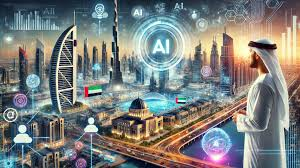Now Reading: “UAE’s AI Strategy vs. Dubai’s Projects: Which One Leads the Future 2025?”
-
01
“UAE’s AI Strategy vs. Dubai’s Projects: Which One Leads the Future 2025?”
“UAE’s AI Strategy vs. Dubai’s Projects: Which One Leads the Future 2025?”

Artificial Intelligence (AI) is no longer just a futuristic idea for the United Arab Emirates (UAE)—it’s a national mission. Over the past few years, the UAE government has rolled out ambitious plans to make the country a global leader in AI technology. But within the country, Dubai is setting its own pace with innovative city-level projects that are grabbing attention worldwide.
So, what’s the difference between the UAE’s National AI Strategy and Dubai’s AI projects? Are they working together or racing in different directions? This article breaks down both approaches in simple terms and compares them to see who’s leading the AI revolution in the region.
The UAE’s National AI Strategy: Vision 2031

In 2017, the UAE launched the world’s first-ever national AI strategy called “UAE Strategy for Artificial Intelligence 2031.” The main goal of this plan is to position the UAE as a global hub for AI by 2031.
Main Objectives of the National AI Strategy:

- Enhance Government Performance:
AI will be used to make government services faster, cheaper, and more efficient. Tasks like visa processing, health services, and traffic control are already seeing AI improvements. - Attract Talent and Investment:
The UAE wants to bring in top AI researchers, data scientists, and investors from all over the world. Special programs and AI labs are being set up in universities to train the next generation of AI experts. - Boost Economic Growth:
By 2031, the UAE expects AI to contribute $96 billion to its GDP. Sectors like transport, healthcare, education, and space are key focus areas. - Build Smart Infrastructure:
AI will help build smart cities, improve energy use, and develop advanced healthcare systems. Abu Dhabi and Dubai are already showing results in this space. - Ethical AI Development:
The strategy promotes the ethical use of AI, including privacy protection, safety standards, and responsible data usage.
Dubai’s AI Projects: City-Level Innovation at Its Best
Dubai is taking the national vision and giving it a city-specific twist. Through its Dubai 10X initiative, Smart Dubai program, and partnerships with tech giants like IBM and Microsoft, the city is making AI part of daily life much faster than many other cities worldwide.
Key AI Projects in Dubai:
- Smart Dubai:
A government-backed effort to make Dubai the world’s smartest city. AI is used in services like DubaiNow, which offers 130 government services via one app—from paying bills to renewing licenses. - RoboCop Patrols:
Dubai Police has introduced AI-powered robot cops that help tourists, guide people, and provide safety support in public areas. - AI in Healthcare:
Hospitals in Dubai are using AI for early disease detection, robotic surgeries, and personalized patient care plans. - AI-Driven Transportation:
Dubai is testing autonomous taxis and flying drones for delivery services. By 2030, 25% of all transport in Dubai is expected to be autonomous. - AI Court System:
Dubai has even started using AI in its legal system to help solve simple disputes faster and more fairly.
UAE’s National AI Strategy vs. Dubai’s AI Projects: The Key Differences
| Aspect | UAE National AI Strategy | Dubai’s AI Projects |
|---|---|---|
| Scope | Nationwide: Covers all seven emirates | City-level: Focused on Dubai alone |
| Focus Areas | Economy, education, healthcare, environment, space | Smart city services, police, transportation, courts |
| Implementation Speed | Long-term (up to 2031) | Fast-moving, already live in many sectors |
| Investment Attraction | Global talent and investors for national growth | Private-public partnerships for urban development |
| Technology Partners | Government labs, universities, international alliances | IBM, Microsoft, private tech firms in Dubai |
| Public Interaction | Policy-driven, less direct public involvement | Direct public use (e.g., robot cops, AI services) |
Are They Competing or Complementing Each Other?
While it may seem like Dubai is racing ahead on its own, experts believe these two strategies are working in harmony. The UAE’s national plan sets the rules, attracts global talent, and funds research. Meanwhile, Dubai’s projects test these ideas in real life.
For example, autonomous taxis tested in Dubai could become a model for other emirates like Abu Dhabi or Sharjah in the future. Similarly, AI healthcare systems in Dubai hospitals can inspire upgrades across the national health sector.
In short, Dubai acts as a testing ground, while the UAE National AI Strategy sets the long-term vision.
Challenges to Watch Out For
Both strategies face common challenges, such as:
- Privacy Concerns: AI services collect huge amounts of personal data.
- Cybersecurity Risks: AI systems must be protected from hackers.
- Skill Gap: The country still needs more trained AI engineers and scientists.
- Ethical AI Use: Avoiding misuse of AI in surveillance or biased algorithms is a priority.
What the Future Holds
Looking ahead, the UAE plans to remain one of the world’s top AI-driven countries. Dubai’s success will likely inspire other cities like Abu Dhabi and Sharjah to launch similar projects. Meanwhile, the national government will continue shaping policies and partnerships to make sure the whole country benefits from AI progress.
In this dual strategy, Dubai is the “action lab,” and the UAE’s national plan is the “guiding hand.” Both approaches are critical to the country’s dream of becoming an AI world leader by 2031.
Conclusion
The race between the UAE’s national AI strategy and Dubai’s local projects is not really a competition but a smart collaboration. As Dubai keeps pushing bold and fast city-level innovations, the national strategy builds the framework to make sure these successes scale across the country. Together, they make the UAE a model for how nations can embrace AI for both government and daily life.
Read More:- Shobha Realty Launches Its Most Luxurious Project Yet—Full Details Inside 2025



















